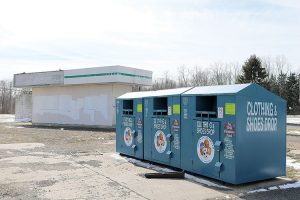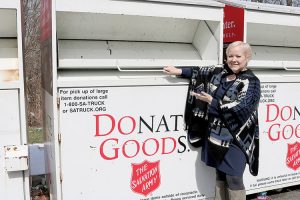By Jay Cook
MIDDLETOWN – While Mother Nature has yet to turn the page on this year’s winter, the calendar says it’s almost time for spring cleaning.
Some people are motivated to recycle and be charitable by placing their used clothing at a neighborhood clothing bin. But lately, some charge the bins have been attracting a plethora of unwanted items and are turning into forlorn garbage heaps.
“It’s a quality of life issue,” Middletown committeeman Tony Fiore said Monday evening, regarding the township’s donation bin situation. “This is an issue where the residents who live near these locations should not have to deal with dumping grounds.”
At a March 6 Middletown Township Committee meeting, Fiore and township administrator Anthony Mercantante opened up a discussion about the 22 clothing donation bins stationed across the 58-square mile township.
“They’re becoming more and more of a problem,” Mercantante said.
With an eye toward amending existing clothing donation bin ordinances created in 2009, Mercantante listed a number of ways the township can crack down on what he described as “eyesores.”
The town can restrict the bins from being dropped off on vacant properties, Mercantante said. It can make sure the bins do not block parking spaces in shopping centers. And it can limit how many bins an organization can place at a single location.
The bins are not allowed on public property in Middletown.

Presently, organizations using the bin pay a $25 fee for a yearly permit. They agree the bins cannot be located within 100 yards from stores that sell fuel, or impede pedestrian or vehicle traffic. They also agree to make sure their donations don’t accumulate around the structure.
At the empty Hess gas station on the southbound side of Route 35 in Middletown, which sits in front of the recently-closed Carrabba Italian Grill restaurant, there are three clothing donation bins from the same organization.
On the opposite side of Appleton Avenue in Leonardo, across from the Wawa gas station and convenience store, are four clothing donation bins at the vacant site of the Wild Scallion restaurant – also placed by the same organization.
Fiore said there was little chance these bins were at least a football field’s length away from the Wawa gas pumps.
In Middletown Plaza, which is anchored by ShopRite and Retro Fitness, another four bins sit in a parking lot directly behind the Route 35/Harmony Road stop light, occupying about five parking spaces.
While bin location and cleanliness is the topic at hand, state law also provides guidelines to the worthiness of the charities collecting these donations. On top of a permit number and addresses displayed on the bin, the law also calls for the telephone number of a “bona fide office,” either for the charity or the bin operator.
So, what happens after the donations are collected?
Normally, the bins are owned and serviced by some sort of recycling company. A charity leases the bin. Any donations inside the bins are then sold to consignment shop-style businesses, potentially worldwide. Profits from the sale are then split at an agreed upon percentage between the bin operator and the charity.
The bins located at the vacant Route 35 Hess station and the old Wild Scallion building are operated and leased out by the same parties. The bin owner is American Recycling Technologies, Inc. (ART), based in Great Neck, NY. The association listed on the bins is Ocean United Soccer, a youth soccer league based in Ocean Township.
“It’s a nice way to just generate a little extra funding to offset the costs, because everything is just so expensive these days,” said Mike Nordstrom, the main contact and a coach within the youth league. “It’s an easier way than just running around to businesses asking for donations.”
Bins located at the Middletown Plaza benefit veterans, both statewide and nationally.
Garden State Wiper, Inc. (GSW), a used clothing contractor based in Hackensack, owns the bins which are sponsored by Amvets, a veteran service organization in Willingboro. Similar to ART, the clothes are sold, and then proceeds are used to support the charity.
“We help veterans with claims and any appeals for the VA issues they might have,” said Michelle Prazan, an executive office manager at Amvets. “We also put the money towards veterans and Americanism programs in the schools.”
Howard Vaccarella, a used clothing coordinator with GSW, said his company is in the donation bin business for other charitable groups, such as Elks Lodges, volunteer fire departments, and Boy Scout groups.
Vaccarella could not comment on the percentage split between GSW and Amvets because GSW is a for-profit business and a private corporation. He did say, though, that regulating clothing donation bins is beneficial.
“Being in the industry, it only helps the good organizations out,” he said.
People who want their used goods to directly help people in New Jersey can donate to the Salvation Army on Newman Springs Road in Middletown.

“It means a lot, for people that are legitimately interested in having their things repurposed, to drop them off and know it’s going to be followed up on,” said Jesebel Cruz, an office manager and case worker at The Salvation Army Red Bank Corps.
Cruz said the non-profit organization prides itself on its 24/7 donation center located behind the building. She said the bins are serviced multiple times a week, and the clothes inside are sent to Trenton for people in the Adult Rehabilitation Centers (ARC), who are recovering from substance abuse.
“Everybody knows the work that we do, and in this case, it goes towards something that affects the whole county,” Cruz said. “I feel that you can’t go wrong.”
Across the Two River area, municipalities have different clothing donation bin ordinances. In Red Bank, the borough enforces the state law. In Oceanport, there are no such restrictions to donation bins. However, in Sea Bright, the borough has the same exact ordinances as Middletown in place. The clerk said due to flooding issues and the size of the town, they cannot have bins littered throughout the municipality.
With Middletown potentially taking a stronger stance on donation bins in the near future, Fiore wanted to make sure the township’s message is not twisted.
“We’re not opposed to these bins – we understand the spirit – but they have to comply by the law,” Fiore said. “They just can’t be unregulated.”
This article was first published in the March 16-23 2017 print edition of The Two River Times.














